Eating from the garden
‘Gold Rush’ zucchini
Genovese basil
‘Rainbow’ Swiss chard
‘Sungold’ tomatoes
Stir-fried in one teaspoon of Bariani olive oil… seasoned with garlic, sea salt and cracked pepper
‘Gold Rush’ zucchini
Genovese basil
‘Rainbow’ Swiss chard
‘Sungold’ tomatoes
Stir-fried in one teaspoon of Bariani olive oil… seasoned with garlic, sea salt and cracked pepper
West Nile found in sample
By Lakiesha McGhee – Bee Staff WriterPublished 12:00 am PDT Monday, July 9, 2007
A mosquito sample collected in the Gibson Ranch area of Sacramento County has tested positive for West Nile virus. The finding was confirmed Friday by the Sacramento-Yolo Mosquito and Vector Control District, which routinely collects and tests mosquitoes for disease. The district said it will continue its Mosquito-Borne Disease Management plan by using localized adult mosquito treatments in and around the area where the virus was detected. Response may involve ground and/or aerial treatments, according to a news release.
In Sacramento County this year, three birds and one mosquito sample have tested positive for West Nile virus, which is transmitted to humans and animals through the bite of infected mosquitoes.
For more information, call the district at (800) 429-1022 or visit the Web site http://www.fightthebite.net/.
UC IPM Pest Note on Mosquitoes: http://www.ipm.ucdavis.edu/PMG/PESTNOTES/pn7451.html
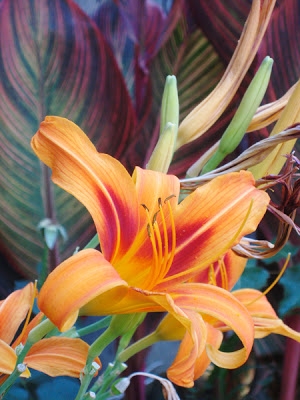
Orange daylily and ‘Tropicanna’ Canna
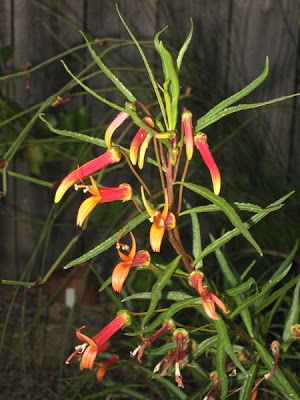
Mexican lobelia (Lobelia laxiflora)
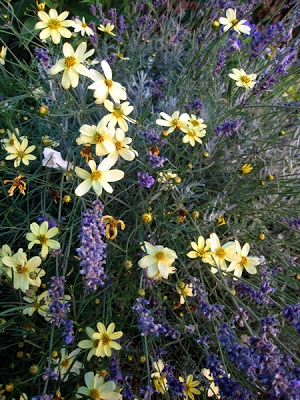
‘Moonbeam’ coreopsis and English lavender
Buddy Purple Gomphrena
Crackling Fire Million Bells
‘Apricot Sprite’ Hyssop (Agastache aurantiaca ‘Apricot Sprite’)
Echinacea ‘Sundown’
The plants are from Windmill and the pot was from Bushnell’s.
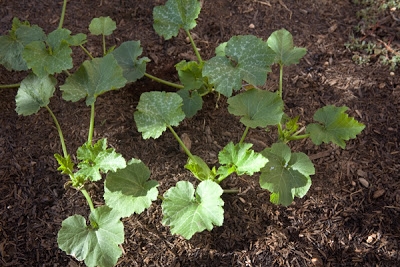
June 10… planted late, in the ground, the lazy way (from starts)
I should be harvesting in a few days! I fantasize about grilling these on a gas grill someday. Just thinking about getting the charcoal grill going makes me want to lie down on the sofa and have Chinese food delivered instead. Perhaps that’s my camping phobia kicking in… camping phobia induced by camping trauma, if you must know.
I brought some Gold Rush zukes to a family barbecue last year and my culinary academy-trained brother sliced them lengthwise, basted them with a garlic, olive oil, balsamic, salt and cracked pepper concoction and slapped them unceremoniously on my aunt’s big, beautiful gas grill. They turned out gorgeously grill-marked and delicious. It would never even have occurred to me to slice them lengthwise, so I suppose brothers are good for something. Who knew?
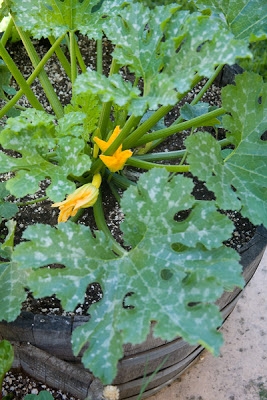
I also stuck two plants in a half-barrel for the heck of it.
http://www.nytimes.com/2007/06/18/us/18moth.html?ex=1339905600&en=f29683b58074a45f&ei=5124&partner=permalink&exprod=permalink
There’s an article in today’s Bee about light brown apple moth (LBAM) monitoring at Green Acres Nursery in Roseville. Apparently, they receive plants from a Bay Area wholesaler deep in the quarantine area. I’ll bet a lot of our local nurseries do.
The article emphasizes that the main concern is not about the potential damage to California plants, but about economic losses in quarantined regions. The San Francisco Bay Area is currently under a Federal Domestic Quarantine Order. Sacramento and the Sierra Nevada Foothills could be next.
If the moth starts showing up in local nurseries, they will face quarantines, which will force them to spray… at first with Neem oil, then with nastier chlorpyrifos if the invasion becomes an infestation. And until they pass agricultural inspection, nurseries presumably won’t be able to ship plants.
As a gardener, it begs the question “What if I do a little shopping in the Bay Area and bring my LBAM-laden plants home to Sacramento? Wouldn’t that do a disservice to local nurseries trying to prevent LBAM from invading?” Hmmm…
Should we become familiar with all stages of the moth and get ready with the Neem oil if we see it on our plants? Should we ask Bay Area nurseries if they’re monitoring for LBAM? Or should we leave the problem to natural enemies of the LBAM, which include the following:
The California Department of Food & Agriculture has put out a nice brochure on the LBAM showing pupal, caterpillar and adult stages and urges you to call 1-800-491-1899 if you discover signs of damage or the insect itself.